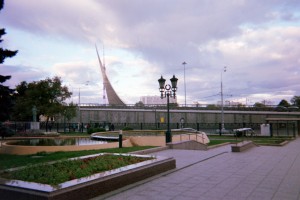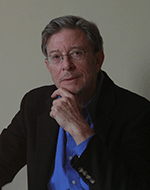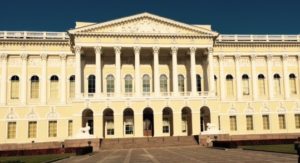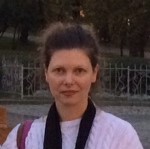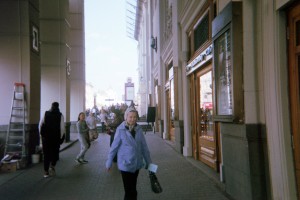
A study from Russia’s largest bank, along with government statistics, indicates that, while still slow, both consumer confidence and year-on-year figures on industrial output, are trending in a positive direction.
As reported by Business New Europe’s Intellinews, Sberbank’s regular survey of consumer attitudes showed an uptick in consumer optimism in all the 6 areas that are surveyed on:
The sixteenth installment of the survey, compiled by Russia’s biggest bank, has for the first time shown an increase in each of its six indices, with confidence in prospects of personal wealth, country wealth, and the ability to make big ticket purchases all improving in the second quarter of 2016 compared with the first quarter.
….Rising wages and lower unemployment were the driving forces behind the mood improvement in Russia, with Sberbank noting that 25% of respondents got a pay rise in 2016, while unemployment fell from 12.1% last quarter to 11.3% in the latest round of polling. Job security has also improved, with the 39% of Ivanovs who are afraid of being fired down from 44% last quarter.
While conditions for the average Russian family have eased in the last three months, the index suggests that few Russians believe that the economy is completely out of the woods, with the “big purchase conditions” index still deep in negative territory, at -26%.
Intellinews also notes that the lowering of inflation played a significant role in fueling consumer optimism. Another report over at Russia Direct goes into more detail about how the inflation rate soared in 2014-2015, particularly with respect to food prices, and how it has been steadily decreasing since the end of 2015. Credit is given to the policies of Elvira Nebuillina, head of the Russian Central Bank. (Note: This analysis leans toward a neoliberal slant – NB)
The Central Bank pursues a consistent policy of inflation targeting, trying to use monetary methods to control price dynamics – and in particular, adjusting the prime rate, which during the crisis, the Central Bank has changed 10 times, and which now stands at 10.5 percent. To a large extent, it was the policy of the Central Bank that has contributed to the sharp slowdown in the country’s inflation rate.
The Central Bank of Russia considers this slowing down in the growth of prices as a long-term trend. In any case, given the current positive price dynamics, it has lowered its forecast for the inflation rate at the end of 2016 to 5-6 percent.
The Ministry of Finance agrees with this forecast, predicting by the end of 2016, the lowest inflation rate in Russia’s recent history – 6 percent.
….Last year, the main drivers of inflation were growing food prices – something painfully felt by the population. Now the situation has changed. In its reports, the Central Bank has noted that food prices grew moderately in May, on an annual basis, in comparison with the prices being charged for industrial goods and services. This was made possible by the “high level of supply of agricultural products, and the successful active implementation of the import substitution program in the food industry.”
Another Intellinews report discusses the most recent year-on-year industrial output numbers, which showed better than expected growth.
Russia’s industrial output put in unexpected ahead of consensus growth in June, increasing by 1.7% y/y and 0.3% m/m in seasonal and calendar adjusted terms, according to a Rosstat report published on July 14.
….The growth beat the Reuters consensus expectation of 0.6% y/y growth in June and the Ministry of Economic Development’s forecast of 0.3% y/y growth.
….Most notably, manufacturing output growth continued to strengthen in June, posting 1.6% y/y growth versus 0.3% y/y seen in May and making the fastest monthly y/y rate in two years.
….Sberbank sees import substitution and a moderate recovery in investment demand as the main growth drivers in the manufacturing sector, with the food industry being the main benefactor from ruble depreciation in terms of output. But textiles, clothing, footwear, and production of pulp and wood also gained.
….”We would also like to point out the growth in the output of tractors (15.6% y-o-y in 1H16) and trucks (4.4%), which may point to an improvement in investment,” Sberbank CIB notes, reiterating its generally positive views that the Russian economy will see a moderate upturn in the second half of the year.
….The usually more conservative Alfa Bank also welcomed the “strong improvement” of the industrial output in June, beating the bank’s 0.5% y/y growth expectations.
The “gray” economy – or the number of people earning a living off the record by being paid under the table – is a major issue in Russia. It adversely affects the government’s budget via lower tax revenue. By some estimates, the gray economy comprises as much as 46% of GDP. As Bloomberg reports, the Putin government is looking into way to address the issue.
Legalizing the shadow workforce alone would boost GDP by one percentage point, according to Boris Titov, the Kremlin’s business ombudsman. No longer limited to retail trade, Titov says it’s becoming a hive of small-scale manufacturing, developing into an “economy of simple things.” Businesses can be tempted into the open if the government can ensure fewer regulatory checks and a patent system catering to the self-employed, Titov said.
The hurdles are many. While Russia has surged by 61 spots in the World Bank’s Ease of Doing Business Index since 2013 to 51st this year, dealing with construction permits still takes almost nine months Its property rights, judicial independence and the burden of government regulation were all rated below the 100th spot among 140 nations in the World Economic Forum’s 2015-2016 Global Competitiveness Report.
The government plans to adopt a law this fall freeing several categories of self-employment from taxes and easing their way to registration, leaving them to pay social levies only, First Deputy Prime Minister Igor Shuvalov said in an interview.
“We understand that only the Tax Service will lead them out of the shadows,” he said. “Now everything is being automatized, financial discipline is increasing. I think that in a couple of years, evading taxes will be extremely difficult.”
Among the most far-reaching ideas yet for nudging businesses out of the shadow economy is a proposal by the Finance Ministry to cut the payroll tax that employers pay on salaries, three officials familiar with the discussions said last month. If a lower levy is accompanied by an increase in the value-added tax, the measures could help authorities collect about 30 percent of the amount of salaries companies pay in cash, which the Finance Ministry has estimated is costing the government as much as 2 trillion rubles a year in lost taxes.
The need to shrink the size of the shadow economy was the subject of a meeting held at the Finance Ministry on Tuesday, which discussed fighting under-the-table salaries to increase tax collection.
By creating the conditions that would motivate entrepreneurs to come clean, Russia may pave the way for a revival of small and medium-sized businesses, whom Putin sees as a foundation for the economy. Such companies employ a fifth of the workforce, far short of the government’s goal to raise the level to at least half the total.
